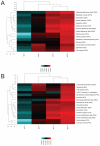Influences of maternal and paternal PTSD on epigenetic regulation of the glucocorticoid receptor gene in Holocaust survivor offspring
- PMID: 24832930
- PMCID: PMC4127390
- DOI: 10.1176/appi.ajp.2014.13121571
Influences of maternal and paternal PTSD on epigenetic regulation of the glucocorticoid receptor gene in Holocaust survivor offspring
Abstract
Objective: Differential effects of maternal and paternal posttraumatic stress disorder (PTSD) have been observed in adult offspring of Holocaust survivors in both glucocorticoid receptor sensitivity and vulnerability to psychiatric disorder. The authors examined the relative influences of maternal and paternal PTSD on DNA methylation of the exon 1F promoter of the glucocorticoid receptor (GR-1F) gene (NR3C1) in peripheral blood mononuclear cells and its relationship to glucocorticoid receptor sensitivity in Holocaust offspring.
Method: Adult offspring with at least one Holocaust survivor parent (N=80) and demographically similar participants without parental Holocaust exposure or parental PTSD (N=15) completed clinical interviews, self-report measures, and biological procedures. Blood samples were collected for analysis of GR-1F promoter methylation and of cortisol levels in response to low-dose dexamethasone, and two-way analysis of covariance was performed using maternal and paternal PTSD as main effects. Hierarchical clustering analysis was used to permit visualization of maternal compared with paternal PTSD effects on clinical variables and GR-1F promoter methylation.
Results: A significant interaction demonstrated that in the absence of maternal PTSD, offspring with paternal PTSD showed higher GR-1F promoter methylation, whereas offspring with both maternal and paternal PTSD showed lower methylation. Lower GR-1F promoter methylation was significantly associated with greater postdexamethasone cortisol suppression. The clustering analysis revealed that maternal and paternal PTSD effects were differentially associated with clinical indicators and GR-1F promoter methylation.
Conclusions: This is the first study to demonstrate alterations of GR-1F promoter methylation in relation to parental PTSD and neuroendocrine outcomes. The moderation of paternal PTSD effects by maternal PTSD suggests different mechanisms for the intergenerational transmission of trauma-related vulnerabilities.
Figures


Comment in
-
An ingeneious study of intergenerational transmission of the effects of PTSD.Am J Psychiatry. 2014 Aug;171(8):811-3. doi: 10.1176/appi.ajp.2014.14050611. Am J Psychiatry. 2014. PMID: 25082486 No abstract available.
-
Journal Watch review of Influences of maternal and paternal PTSD on epigenetic regulation of the glucocorticoid receptor gene in Holocaust survivor offspring.J Am Psychoanal Assoc. 2014 Dec;62(6):1101-3. doi: 10.1177/0003065114560792. J Am Psychoanal Assoc. 2014. PMID: 25503764 No abstract available.
References
-
- Palosaari E, Punamaki RL, Qouta S, Diab M. Intergenerational effects of war trauma among Palestinian families mediated via psychological maltreatment. Child Abuse Negl. 2013 - PubMed
-
- Field NP, Om C, Kim T, Vorn S. Parental styles in second generation effects of genocide stemming from the Khmer Rouge regime in Cambodia. Attach Hum Dev. 2011;13:611–628. - PubMed
-
- Yehuda R, Schmeidler J, Wainberg M, Binder-Brynes K, Duvdevani T. Vulnerability to posttraumatic stress disorder in adult offspring of Holocaust survivors. Am J Psychiatry. 1998;155:1163–1171. - PubMed
-
- Yehuda R, Blair W, Labinsky E, Bierer LM. Effects of parental PTSD on the cortisol response to dexamethasone administration in their adult offspring. Am J Psychiatry. 2007;164:163–166. - PubMed
-
- Yehuda R, Teicher MH, Seckl JR, Grossman RA, Morris A, Bierer LM. Parental posttraumatic stress disorder as a vulnerability factor for low cortisol trait in offspring of holocaust survivors. Arch Gen Psychiatry. 2007;64:1040–1048. - PubMed
Publication types
MeSH terms
Substances
Grants and funding
LinkOut - more resources
Full Text Sources
Other Literature Sources
Medical

